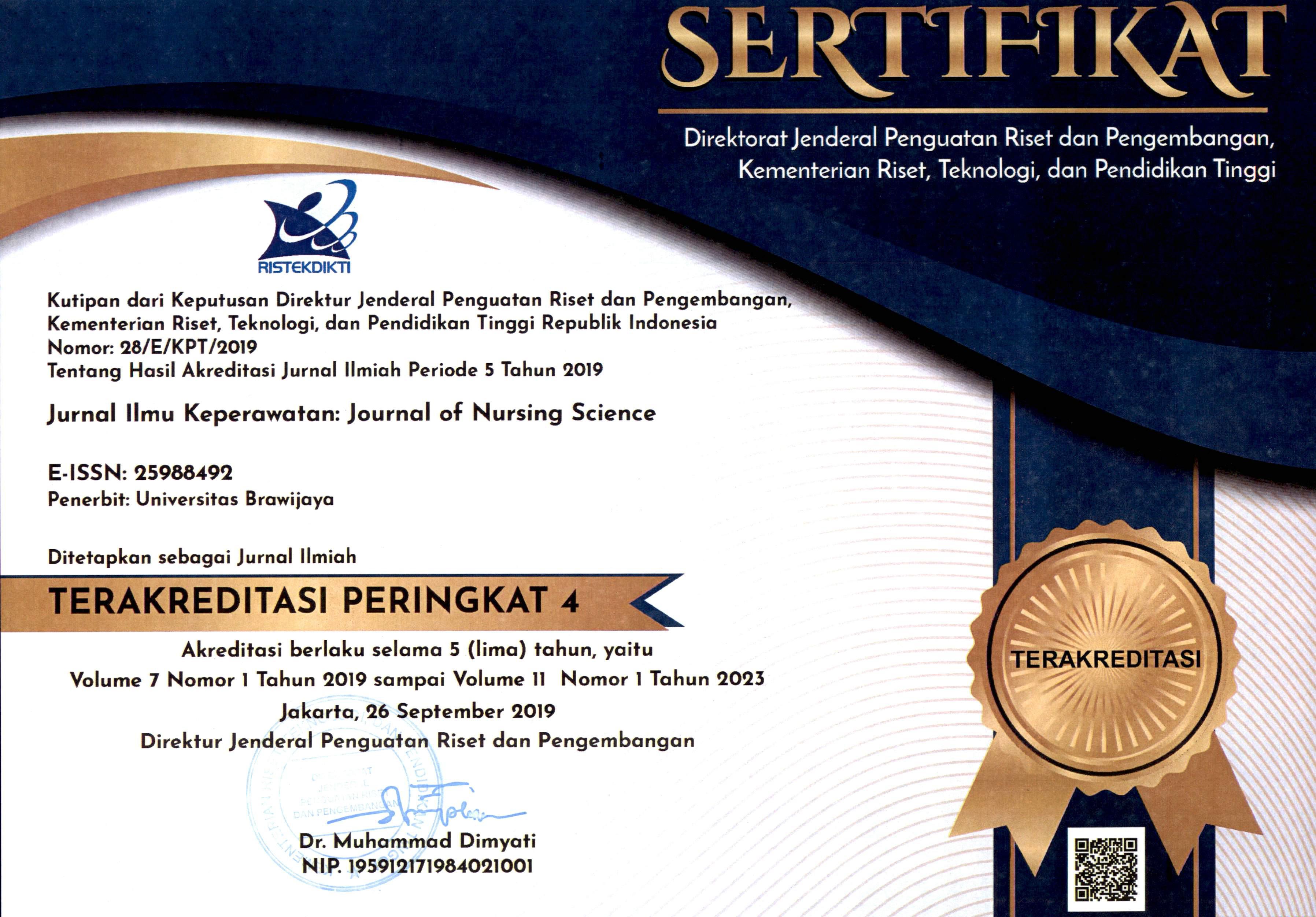Javanese Elderly’s Responses of Stres Due to Neglect by Families: A Phenomenological Study
DOI:
https://doi.org/10.21776/ub.jik.2021.009.01.4Keywords:
Elderly Stres, Javanese culture, Elderly neglect, QualitativeAbstract
References
- Alligood, M. R. (2018). Pakar teori keperawatan dan karya mereka (A. Y. S. Hamid & K. Ibrahim (eds.); 8th ed.). Elsevier Singapore Pte Ltd.
- Andries, A. M. (2011). Positive and negative emotions within the organizational context. Global Journal of Human Social Science, 11(9), 26–39. http://www.socialscienceresearch.org/index.php/GJHSS/article/view/224
- Badan Pusat Statistik. (2019). Statistik penduduk lanjut usia di Indonesia 2019. In Statistik Penduduk Lanjut Usia di Indonesia 2019.
- Barnard, A., Schurink, W., & De Beer, M. (2008). A conceptual framework of integrity. SA Journal of Industrial Psychology, 34(2), 40–49. https://doi.org/10.4102/sajip.v34i2.427
- Dewe, P. (1997). The transactional model of stress: some implications for stress management programs. Asia Pacific Journal of Human Resources, 35(2), 41–51. https://doi.org/10.1177/103841119703500205
- Dewi, S. (2014). Buku ajar keperawatan gerontik (1st ed.). Deepublish.
- Efendi, F., & Makhfudli. (2009). Keperawatan Kesehatan Komunitas Teori dan Praktik dalam Keperawatan. Salemba Medika.
- Herusatoto, B. (2008). Simbolisme jawa. Ombak Yogyakarta.
- Irawan, M., Prasetyo, K. B., & Arsi, A. A. (2016). Pergeseran Nilai Orang Tua Di Kalangan Masyarakat Jawa (Studi Pada Lansia Yang Tinggal Di Panti Wredha Dharma Bhakti Surakarta). Solidarity, 5(2).
- Kementerian Kesehatan RI. (2013). Buletin jendela data dan informasi kesehatan: topik utama gambaran kesehatan lanjut usia di Indonesia. https://doi.org/10.1017/CBO9781107415324.004
- Kurniawan, A. P., & Hasanat, N. U. (2007). Perbedaan ekspresi emosi pada beberapa tingkat generasi suku jawa di Yogyakarta. Jurnal Psikologi, 34(1), 1–17.
- Maryam, R. S., Ekasari, M., Rosidawati, Junaedi, A., & Batubara, I. (2008). Mengenal usia lanjut dan perawatannya. Salemba Medika.
- Maurier, F., & Smith, C. (2005). Community public health nursing practice: Health for families and populations (3rd ed.). Elsevier-Saunders.
- Musradinur. (2016). Stres dan cara mengatasinya dalam perspektif psikologi. Jurnal Edukasi, 2(July), 183–200. https://doi.org/10.22373/je.v2i2.815
- Nadhiroh, Y. F. (2015). Pengendalian emosi (Kajian religio-psikologis tentang psikologi manusia). Jurnal Saintifika Islamicaslamica, 2(1), 53–63.
- O Donovan, R., Doody, O., & Lyons, R. (2014). The effect of stress on health and its implications for nursing. British Journal of Nursing, 22(16), 969–973. https://doi.org/10.12968/bjon.2013.22.16.969
- Pauw, L. S., Sauter, D. A., van Kleef, G. A., & Fischer, A. H. (2019). Stop crying! The impact of situational demands on interpersonal emotion regulation. Cognition and Emotion, 0(0), 1–12. https://doi.org/10.1080/02699931.2019.1585330
- Prabasari, N. A., Juwita, L., & Maryuti, I. A. (2017). Pengalaman keluarga dalam merawat lansia di rumah. Jurnal Ners LENTERA, 5(1), 56–68.
- Ramlah. (2011). Hubungan pelaksanaan tugas kesehatan dan dukungan keluarga dengan pengabaian lansia di wilayah kerja Puskesmas Kassi-Kassi Makasar. Universitas Indonesia.
- Rismanda, F. (2014). Studi dekskriptif kekerasan pada lansia dalam keluarga di Desa Tandang Kecamatan Tembalang Semarang. FIKKeS Jurnal Keperawatan F, 7(2), 1–12.
- Setiawan, A., Budiatmodjo, E., Ramadani, K. D., & Sari, N. R. (2015). Statistik Penduduk Lanjut Usia Indonesia 2015. Badan Pusat Statistik, 414. https://www.bps.go.id/publikasi/view/4317
- Setiyowati, N. (2017). “Suwungâ€: Pola penyelesaian masalah kaum sufi suku Jawa di Kota Malang. Jurnal Psikologi Ulayat, 3(2), 109. https://doi.org/10.24854/jpu22016-66
- Stanhope, M., & Lancaster, J. (2004). Community and public health nursing. Mosby.
- Wijayanti, R., Sahar, J., & Sutanto. (2007). Hubungan antara dukungan keluarga melalui mnteraksi sosial, upaya penyediaan tansportasi, finansial, dan dukungan dalam menyiapkan makanan dengan respon kehilangan pada lansia di Desa Pekaja, Kalibagor Kabupaten Banyumas. Jurnal Keperawatan Soedirman (The Soedirman Journal of Nursing), 2(1), 17–23.
Downloads
Published
How to Cite
License
Authors published in this journal agree to the following terms:
1. The copyright of the received article shall be assigned to the journal as the publisher of the journal. The intended copyright includes the right to publish the article in various forms (including reprints). The journal maintains the publishing rights to the published articles.
2. Authors may enter into separate additional contractual agreements for the non-exclusive distribution of the published journal version of the work (for example, posting it to an institutional repository or publishing it in a book), with acknowledgment of their initial publication in this journal.
3. Authors are permitted and encouraged to post their work online (e.g. in an Institutional Repository or on their website) before and during the submission process, as this can result in a productive exchange, as well as earlier and larger citations of the published work.
4. Articles and all related material published are distributed under Creative Commons Attribution-NonCommercial 4.0 International License or CC BY-NC 4.0 license.
JNSU is licensed under a Creative Commons Attribution-NonCommercial 4.0 International License or CC BY-NC 4.0 license.






























